Roman Civ midterm 2
1/82
There's no tags or description
Looks like no tags are added yet.
Name | Mastery | Learn | Test | Matching | Spaced |
|---|
No study sessions yet.
83 Terms
Cataline Conspiracy
a failed candidate for consul, a conspiracy formed to take control of the government. He raises an army outside of the city
Marcus Tullius Cicero
educated influential lawyer novus homo in 63 BC
64 Bc elected Consul
made anti-catiline speeches of his plotting with his army outside of the city and executed his co-conspirators without a trial completely contrary to Roman law leading to exile.
speechifies against Cataline and he gets squashed. It says about late roman republican politics the constitution could be bent.
The First Triumvirate
Crassus, Pompey, and Caesar were all thwarted by the Senate forming this alliance to look out for each others’ interests.
Caesar as consul in 59 BC passed Pompey;s legislation.
Pompey senate confirmation of diplomacy in east mediterranean land for veterans.
Crassus desired to restore his military standing + reduction of allied publicani’s debts
Consulship of Caesar and Bibulus and ally of the senate 59 BC.
Bullies opponents in the senate→bibulus the shut in
Legislation favorable to the first Tri and a new land law
Bibulus tactic of utilizing the fear of the gods by reading omens.
Gnaeus Pompeius Magnus/ Pompey
Offers his support to Sulla in 83 BC and son of Consul.
Nicknamed adulescens carnifex “the teenage butcher”.
70s BC put down separatist state in Spain revolt.
named consul along Crassus.
64 BC deposed last Seleucid King Philip II Philoromaeus.
The Senate, jealous of his success, was unwilling to approve his eastern settlement or pass a law granting lands to his army after his return in 62 BC.
granted a 3rd triumph in 61 BC.
as a foreign policy maker- popular general who plays a big role in affairs in the East.
83 BC 23 y/o offers an army to sulla→commands in Gaul, Sicily, Africa with triumph then spain with triumph. They called him Pompey the great
Sidenote in portraits- cowlick in the hair a tribute to alexander the great.
M. Licinius Crassus
role in suppressing the slave revolt led by Spartacus in 71 BCE. However, his ambition for military glory led to his ill-fated campaign against the Parthian Empire, culminating in his defeat and death at the Battle of Carrhae in 53 BCE
67 BC, Gabinian Law
Gace Pompey extraordinary command on the sea against pirates. Pompey vs. the pirates. Pompey had authority throughout the mediterranean and 50 km inland to fix things with the pirates
66 BC Manilian Law?
Put Pompey in charge of war against Mithridates and resulted in engagements with the people of Western Asia. Pompey vs. Mithridates VI third Mithridatic war.
Theater of Pompey 55 BC
The first permanent stone built theater of Rome; with the temple of Venus Victrix dedicated 55 BC.
Julius Caesar early political career
Legate in Asia
Nephew of Marius and son in law of Cinna.
Starts rising in the cursus honorum.
Caesar starts as quaestor in 69 BC →aedile in 65 →ponitfex maximus in 63 BC→praetor 62 BC→propraetor in Spain 61 BC
He got popular support by restoring the trophies of his uncle Marius to the capitoline temple and sponsoring gladiators.
Caesar as dictator perpetuus.
46 BC Julius Caesar declared dictator for 10 years→ late 45 Caesar declared dictator for life.
Reforms: Julian calendar, codified laws, Gauls as citizens and senators, building projects ex. Curia Julia, Forum Iulium. Basilica Julia and new curia in the forum
Forum Julium= new type of imperial forum type oriented to a capital of the Roman empire.
Temple of Venus Genetrix: ties to his ancestors and lineage
Legati Augusti
equestrian provincial officials (prefects, procurators,) regular provincial censuses.
Forum Julium
new type of imperial forum type oriented to a capital of the Roman empire.
Temple of Venus Genetrix
ties to Caesar’s ancestors and lineage
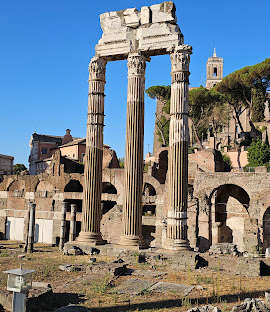
Brutus and Cassius
led an unorganized coup. Caesar dead by March 15 44 BC
clementia
mercy
Curia Julia
the Senate House of ancient Rome, located in the Roman Forum. It was commissioned by Julius Caesar in 44 BCE to replace an earlier Senate building, the Curia Hostilia. However, Caesar's assassination delayed its completion, and it was finished by his heir, Augustus, in 29 BCE.
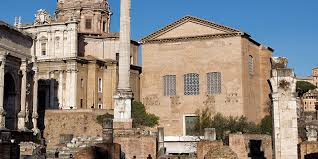
Basilica Julia
grand public building in the Roman Forum, commissioned by Julius Caesar in 46 BCE and completed by Augustus
multifunctional space for civil law courts, government offices, and public gatherings. The structure was adorned with marble and featured a large central hall surrounded by columns and arches.
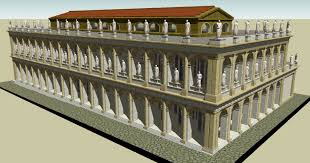
Julian Calendar
introduced by Julius Caesar in 46 BCE, was a reform of the Roman calendar to align it more closely with the solar year
forum iulium
also known as the Forum of Caesar, was the first of the Imperial Fora in ancient Rome. It was commissioned by Julius Caesar in 54 BCE and inaugurated in 46 BCE, though it was completed later by Augustus. Located adjacent to the Roman Forum, it served as an extension of the bustling civic and political center.
designed to showcase Caesar's power and legacy. At its heart stood the Temple of Venus Genetrix
Octavian
born Sept 23 63 BCin Velitrae Rome
Caesar helps his grand nephew begin in politics
Pontifex at 16→patrician at 17→magister equitum for CAesar’s parthian campaign
heir to 2/4 of Caesar’s estate and his name
Fulfilling the role of heir after Caesar assassination
Comitia Centuriata to confirm adoption. A patrician favored assembly: demonstrates he has in mind to have the patricians on his side.
Fulfills Caesar’s stipulation: 200k sesterces to 300 plebeian households. Whole lotta money.
Stopped by Marc Antony who contests this in court. He retaliates with his own personal funds. Pietas.
Gives games in Caesar’s honor + a comet streaking which he used as an omen.
Promotes decree to declare Caesar as god→ as divi dilius=son of a god
The Second Triumvirate 43-31 BC
Octavian, Marc Antony, and Lepidus formed the 2nd Triumvirate in 43 BC.
Confirmation of Centuriate Assembly
Goal to defeat Brutus and Cassius in Macedonia after proscriptions in Rome.
Octavian and Antony vs Brutus and Cassius: Battle of Philippi 42 BC.
Octavian sends Brutus’ head to Rome and denies body burial.
Next step to ensure the empire is fine
Lepidus maintaining order in Spain and Africa
Antony goes east to secure borders
Octavian in Rome
36 BC Grain crises and food shortage and heavy wealth taxes. Rioting suppressed with troops.
princeps senatus
Roman imperial government the Principate.
Imperium proconsulare maius
supreme military command: his military command supersedes any governors and he is commander in chief.
Second Settlement” of 21 BC
consulship replaced with
Imperium proconsulare maius=supreme military command: his military command supersedes any governors and he is commander in chief.
Tribunicia potestas=power of the tribune reaffirmed every year. Tribune in chief essentially and could do everything a tribune could do.
Additional political changes:
Augustus pontifex maximus from 12 BC + priest in all main priesthoods
Augustus declared “father of the country” pater patriae 2 BC
Augustus nominates or directly appoints magistrates
Consuls and suffect consuls each year. Now gave senators four consul slots.
First Settlement 31-27 BC
Octaviun consul every year with colleagues.
Imperium renewable every 10 years over most strategic provinces with most legions.
Special title Augustus= imperator Caesar Divi Filius Augustus
Censorship to give himself leadership of the senate/role of princeps senatus= Roman imperial government the Principate.
Tribunicia potestas
power of the tribune reaffirmed every year. Tribune in chief essentially and could do everything a tribune could do.
Perusine War 41 BC
Lucius Antonius and Antony’s wife Fulvia start a revolt against Octavia and defeated by Agrippa after siege.
Survivors cruelly treated.
Octavian calling himself imperator Caesar Divi Filius= general caesar son of a god
Second triumvirate reaffirmed by Treaty of Brundisium 40 BC.
Antony now free with political marriage of Octavia and Antony
Roman imperial cult
Cult to roma and the emperor’s guardian spirit
Relatively standardized portraits of emperor and family
Proposal originated in E mediterranean among traditions of divine kingship.
mare nostrum
the mediterranean as our sea
Germania
expansion of territory to Rhine River
Teutoburg Forest 9 AD
Arminius obliterates Quinilius Varus’ 3 legions located there
Fulvia
wife of Marc Antony who starts revolt
Livia Drusilla
58 BC-29 AD wife of Augustus 38 and sons were Tiberius and Drusus
Divi Filius
son of a god
Donation of Alexandria 34 BC
Antony names Cleopatra queen of Egypt, Cyprus, Cyrene, parts of Syria and their 3 sons kings of other territories.
Battle of Philippi 42 BC.
Octavian and Antony vs Brutus and Cassius:
Octavian sends Brutus’ head to Rome and denies body burial.
Augustus as priest
Augustus pontifex maximus from 12 BC + priest in all main priesthoods
Principate
the first phase of the Roman Empire, established by Augustus in 27 BCE and lasting until around 284 CE. It marked a transitional period where Rome retained the outward appearance of a republic, but real power was concentrated in the hands of a single ruler, the princeps (meaning "first citizen"). Augustus, the first princeps, carefully maintained the facade of republican institutions while holding supreme authority over the military, administration, and legislation.
This system allowed emperors to govern with significant control while avoiding the perception of outright monarchy, which was unpopular in Roman culture.
idealized naturalism
greek style of art and portraiture instead of verism
Julia Augusta
advisor and imperial first lady
Hairstyles to emulate messages
Maison Caree 4-10 AD
dedicated to Gaius and Lucius Caesar
Pont du Gard
at Nimes, Gallia, dedicated by M. Agrippa 16 BC.
Masonry built three story bridge supporting an aqueduct. Utilitarian structure bringing water to the city
House of Augustus: 30-25 BC
on Palatine Hill, a normal aristocratic house.
Mausoleum of Augustus completed in 23 BC
meant to be the resting place of him and his family. Emphasized their high standing.
Cylindrical concrete body topped by a large mound of earth. Mirrored etruscan architecture. Augustus’ eye to tradition.
Res Gestae on bronze tablets at front
Prima Porta Augustus
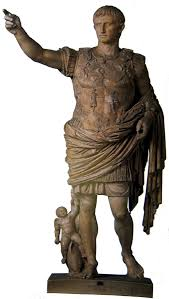
Marcellus
successor 1 42-23 BC octavia’s son
M.Agrippa
Successor #2: (d. 12 BC) –
maius imperium 18 BC
–
Gaius and Lucius Caesar
Successors #3: (20 BC
– 4 AD; 17 BC – 2 AD) – A’s grandsons by
Agrippa + Julia
Tiberius
Actual Successor: successful
general in Germania,
Pannonia
Bust of M. Vipsanius Agrippa,
from Gabii, 25-24 BC
Temples of Saturn,
Castor and Pollux,
Vesta
• New Temple of
Divine Julius Caesar
Augustus renovated
Forum of Augustus
(24-2 BC)
Corinthian colonnaded
rectangular space with
Temple of Mars Ultor
(the Avenger
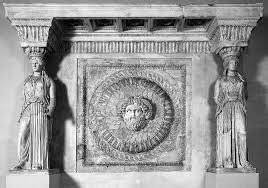
Temple of Mars Ultor
vowed by Augustus before defeat of Brutus &
Cassius
• Cult statues of Mars, Venus, divine Julius Caesar
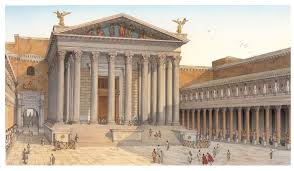
caryatids
On top of column around Forum of Augustus were statues of maidens →meaning? Show the adoption of greek culture, Erechtheion was built in the classical period so it is a monument to Athen’s height of an Agean wide empire.
euergetism
the practice of elite gift-giving to cities or groups within them in ancient Greek and Roman societies, often as a way to enhance their social standing and influence
Algiers Relief, early 1st cent. AD
likely depicts the cult statues of the Temple of Mars Ultor, featuring figures of Mars, Venus, and Divus Julius (deified Julius Caesar).
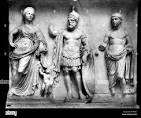
Horologium and Ara Pacis
Altar of Peace),
13-9 BC, Campus Martius, Rome
Affirmation of Rome’s mythical beginnings
• She-wolf suckling Romulus + Remus and Mars looking on
• Trojan prince Aeneas offering sacrifice
Roma on pile of armor (dominance + power of Rome)
• Personifications of land, sea, and Mother Earth/Venus/Italia/Peace
Long sides: procession of imperial family, senators, priests
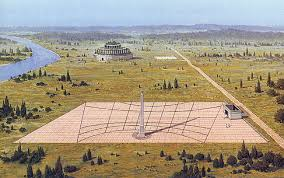
Baths of Agrippa (25 BC), Theater of Marcellus (13 or 11 BC)
Construction of buildings that benefited image of
possible successors, idea of succession
Gaius and Lucius Caesar
temple of the imperial cult
Bust of Cicero
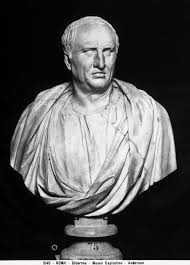
Bust of Pompey
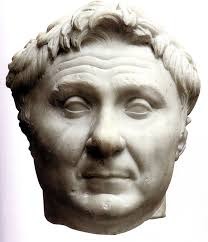
Bust of Caesar
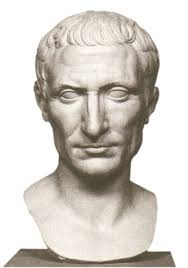
Bust of Crassus
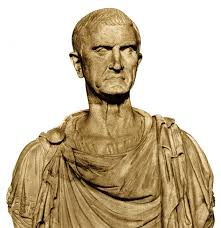
Livia as Ceres,
15-45 AD
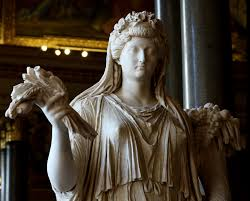
Bust of Livia from Arsinoe
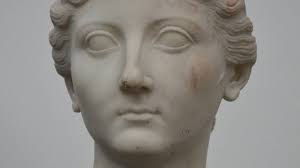
Bust of Julia the Elder,
Used as political pawn (married to
Marcellus, then Agrippa, then
Tiberius
• Exiled in 2 BC for “rebellious” sex life
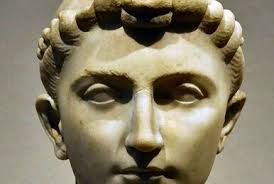
Bust of M. Vipsanius Agrippa
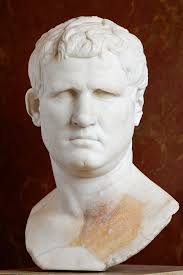
Publius Vergilius Maro
born 70-19 bc in northern italy.
Eclogues 40 BC and Georgics 30 BC→Greek literary models and contemporary Roman culture.
In cuticle of leading Roman intellectuals associated with Augustus
Aeneid
depicts defeat and dispossession of being human and love and loss of loves as well as a life dictated by the sense of duty to the gods, his people, and family.
Aeneaus were driven across the Mediterranean by the wrath of Juno. Aeneus picture of him hoisting his father to Troy.
Augustus wanted a national epic about the first founder of Roman people Aeneas descendent of Julian family
Myth as metaphor: what does it mean to be Roman in the Age of Augustus? Aeneas as code for Augustus
Twin Gates of sleep
Gate of horn and Ivory Gate
One idea that virgil wants u to think that everything he said is false.
role of transformations
Defining and bringing order to chaos and structure to life. Changing the cycle from chaos and uncertainty to certainty and structure.
Julian Laws
on morality, marriage, adultery, sponsored by Augustus passed 18/17 BC revised 9 AD
Marriage law: tax benefits for large families, penalties against single men aged 25-60 and women aged 20-50 wor against couples without children
Adultery law: adultery among upper classes triable in court and penalized through gines and exile; women punished more harshly
Upper class reaction is highly unfavorable.
cosmogony
gods and nature
Golden age
time of Titans: blessed sort of life with no work and no laws and leisure
silver age
time of the olympians: seasons occur, people start farming and living in houses
bronze age
war-like ready to arms but not wicked
iron age
inequity explodes–exploding the Earth for gain. Start building ships and setting sail. War
the Four Ages
Steady increase in need to work
Sudden increase in human wickedness
Publius Ovidius Naso
playful poet of tender love but his modern scholarship had a more provocative and violent approach.
Ovid writing all about love and lust in traditionalist Age of Augustus
furor
passion, madness, rage→opposed to imperium
Fall of Troy
besieged and sacked by the Greeks
Marc Antony
prominent Roman politician and general who lived from 83 BC to 30 BC. He played a crucial role in the transition of Rome from a republic to an empire
a close ally of Julius Caesar and served as one of his generals during the Gallic Wars and Caesar's civil war.
After Caesar's assassination in 44 BC, formed the Second Triumvirate with Octavian (later Augustus) and Lepidus, dividing control of the Roman Republic among themselves.
governed Rome's eastern provinces and developed a famous relationship with Cleopatra VII of Egypt, which led to political tensions with Octavian. These tensions culminated in the Battle of Actium in 31 BC, They fled to Egypt, where both ultimately committed suicide
Marcus Agrippa
a Roman general, statesman, and architect, best known as the close friend and trusted lieutenant of Augustus (formerly Octavian).
defeated the forces of Mark Antony and Cleopatra, securing Augustus' position as the first Roman emperor.
Married Julia the Elder, Augustus' daughter, strengthening his bond with the imperial family.